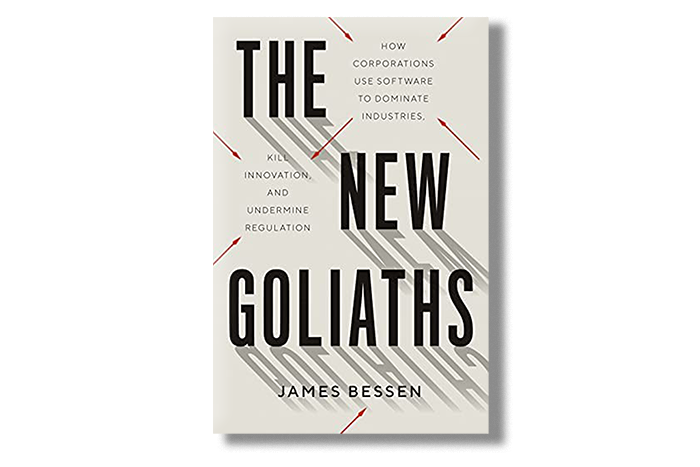School of Law Expert Jim Bessen’s New Book: Software Is Hobbling Innovation as Much as Promoting It
Jim Bessen’s new book examines how tech isn’t always the great disruptor its advocates claim

Proprietary software, developed by companies for their own business use and no one else’s, serves as a lock on the technical innovation that software supposedly promotes, LAW’s Jim Bessen argues in his latest book. Photo by erhui1979/iStock
School of Law Expert: Software Enables Innovation, Except When It Doesn’t
Jim Bessen’s new book examines how tech isn’t always the great disruptor its advocates claim
Software is an earthquake of innovation, as new versions developed by upstart companies topple industry leaders and remake the technology landscape. That’s the popular tale.
It’s wrong. Or at best, it’s incomplete.

So says Jim Bessen in his latest book, The New Goliaths: How Corporations Use Software to Dominate Industries, Kill Innovation, and Undermine Regulation (Yale University Press, 2022). Bessen, a School of Law lecturer and executive director of LAW’s Technology & Policy Research Initiative, argues that in industry after industry, big companies have developed their own software to manage the various facets of their business—and suppress the competition, fostering economic inequality in the process. In the last quarter century, a company’s chance to knock down the leading firm in its industry has halved, Bessen says.
“We tend to think of technology as promoting innovation that disrupts industries and brings major social benefits,” he tells BU Today. “That still happens, but now technology is also being used to suppress disruption, to allow dominant firms to become increasingly dominant. Too often, technology today is being used to steal business from other firms rather than to increase the common good. This paradigm shift poses a challenge to the dynamism and long-run health of our economy.”
Bessen’s book dissects examples from major banks, insurers, and drug makers to Walmart, Google, and Facebook. He discusses his findings with BU Today.
Q&A
with Jim Bessen
BU Today: Could you define “proprietary software” in layperson terms and explain why it has hampered innovation?
Bessen: People often think of software as a prepackaged, standardized product that can be bought shrink-wrapped or downloaded. But the proprietary software my book focuses on is something different. These are large, custom-built systems designed to handle the specific needs of an individual firm. These systems sometimes cost billions of dollars and typically include the acquisition of large amounts of data, computer equipment, and organizational changes. This technology is typically not sold or licensed, but is used to increase the firm’s competitive advantage.
BU Today: From the continuing strength of the job market, which has surprised economists, to our COVID-19 vaccines, which are better than those of several other nations, could it be argued that we haven’t yet suffered seriously from entrenched industry leaders and stifled innovation?
Bessen: The concerns I raise are about long-term trends that might not be obvious from current events. In the short run, the economy goes up and it goes down, but trends in innovation and productivity have a large impact on how we will fare in 10 or 20 years. And here the news is not so good. Productivity—the amount of output produced for a given amount of labor and other inputs—has been growing much more slowly than in the past. This places a limit on our future incomes.
More concretely, innovative start-ups have been growing much more slowly—it takes them longer to raise funds and it takes them longer to go public or to be acquired. This means that while we still will see innovation, it tends to be less, diminishing our future economic prospects.
We tend to think of technology as promoting innovation that disrupts industries and brings major social benefits. That still happens, but now technology is also being used to suppress disruption.
BU Today: What policies might help address this innovation problem and how would they be beneficial?
The large-scale proprietary technologies that dominant firms use bring real value to consumers. For this reason, the goal should not be to break up large, powerful corporations, as some have argued. Instead, we need to think of ways to encourage or compel them to make parts of their systems and data available to others, especially innovative smaller firms. This will allow innovative companies to grow and it will increase competition.
An example of this is Amazon Web Services, the first “cloud” service. In order to meet the IT demands for its e-commerce websites, Amazon developed highly sophisticated IT infrastructure that could handle very high levels of transactions. By the mid-2000s, they realized that this IT capability represented an important competitive advantage. But instead of clinging tightly to this proprietary advantage, Amazon chose to offer their infrastructure to the public for a fee. The smallest companies can now access these highly advanced capabilities, and research has shown it allows them to be substantially more productive. Amazon’s actions created today’s cloud industry; it also brought tremendous profits to Amazon, and it has helped boost our aggregate productivity.
Government policy can encourage more companies to make their proprietary technologies more broadly available. One tool is antitrust enforcement. In the past, antitrust authorities have encouraged or required dominant firms to license their patents and technologies. In one famous example, at a time when software was included with computer hardware for free, the government coaxed IBM to sell its software separately from its hardware. This “unbundling” permitted the rise of a large, independent software industry. It also proved highly profitable to IBM and beneficial to society.
Another set of policies relates to employee mobility. One important way that new technology has spread is via the knowledge of people who work with it. Recent trends regarding trade secret law and employee noncompete agreements, however, have made it more difficult for employees to take jobs at other firms where their knowledge might be valuable. Slowing the spread of knowledge makes the economy less dynamic.

Comments & Discussion
Boston University moderates comments to facilitate an informed, substantive, civil conversation. Abusive, profane, self-promotional, misleading, incoherent or off-topic comments will be rejected. Moderators are staffed during regular business hours (EST) and can only accept comments written in English. Statistics or facts must include a citation or a link to the citation.